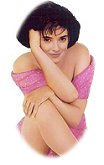


© The Washington Post.
No copyright infringement is intended.


By: Hal Hinson
Whatever one might say about Jim Abrahams's "Welcome Home,
Roxy Carmichael," it sure is literary.
Brother is it literary.
The story centers on the transformation of an eccentric
teenager named Dinky (Winona Ryder). It is set during the days
before the return of her hometown's one great claim to fame, its
one true star: Roxy Carmichael. Roxy is a legend in Clyde, Ohio,
though, we come to learn, a legend without portfolio. From the
hoopla attending her return, you would think that she was a figure
of equal stature with Cher or perhaps Elvis; there are even tours
of the star's childhood home, complete with the kitchen table and
a "typical" Sunday meal.
Though perhaps the point of all this is to emphasize just
what a nowhere spot Clyde is, it seems excessive considering that
Roxy's only accomplishment is that she had a hit song written
about her. Whatever the circumstances, Clyde is all atwitter over
Roxy's homecoming; everyone seems to lay some claim to a special
relationship with her that each hopes, with some desperation, will
be renewed by her visit.
This is particularly true of Dinky. An adopted child who
feels estranged from her parents and the other kids at school, who
wears only black, never brushes her hair and spends most of her
time communing with the menagerie of stray animals she keeps down
by the river, Dinky is convinced that Roxy is her real mother. And
the speculation isn't idle. Before Roxy left town, she had a baby
girl with her boyfriend, Denton (Jeff Daniels), who left the infant
on the doorstep of a nearby hospital. Certain that she is that
abandoned child, and that her mother is coming back to claim her,
Dinky prepares to leave.
"Welcome Home, Roxy Carmichael," which was written by Karen
Leigh Hopkins, bears a resemblance in both its broad strokes and its
details to a thousand and one bad autobiographical plays dealing
with misunderstood teenagers and their agonies. In spirit, it's like
secondhand Beth Henley, with all the literary structures poking out
through the skin. Though it's clear that the author is drawing
directly from her own experiences--she, too, grew up in a small Ohio
town--there is no feeling of genuine experience in it. Dinky is a
classically alienated teenager, taunted, picked on and without either
adult or teenage friends. It's a given, too, that she is exceptional,
a rare breed who follows her own path. As she demonstrated in
"Beetlejuice," Ryder has a talent for these haunted adolescents.
She has a real darkness in her, which she translates easily into
comedy, and in some of her scenes here, she's touchingly funny and
even, on occasion, moving.
Where the movie sabotages her, though, is by insisting that all
she really wants is to be like everyone else. It provides her with a
guidance counselor (Laila Robins) who claims to accept her as she is,
then says, "Dinky, what if we brushed your hair?"; and a classmate
(Thomas Wilson Brown) who's infatuated with her because she's smarter
than everyone else, but urges her to "take more of an interest" in her
appearance. And what it obliquely tells us is that if Dinky were to
clean herself up and get a boyfriend, all her problems would vanish.
What we want, of course, is for Dinky to remain as singular --
though perhaps not as unhappy -- as she has been. Her antisocial
tendencies, her disdain for her parents' lifestyle and the homeroom-
style superficiality of her classmates are what draw us to her. We
like her messy hair and her surliness; we want her intact. We say,
let Dinky be Dinky.